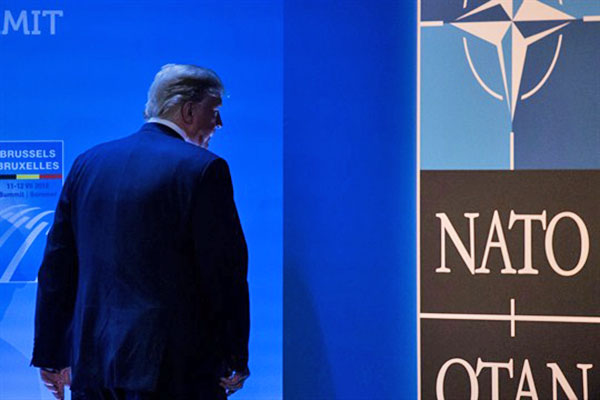|
July 27, 2018 from WorldPoliticsReview Website
at the end of the NATO summit in Brussels, Belgium, July 12, 2018. Photo by Bernd von Jutrczenka for DPA via AP Images
At the time, this didn't receive as much attention as Trump's other statements on the campaign trail.
Candidate Trump said so many peculiar, often offensive things that this one got lost in the shuffle, and few people at the time thought that he stood a chance of winning the election anyway.
Even his supporters assumed
that if he did, he would temper his more extreme positions once he
learned more about U.S. foreign and security policy.
For Trump,
the crux of the issue is the failure of many NATO members to move
toward the goal of spending 2 percent of their GDP on defense, which
they have
pledged to do by 2024.
While the idea of security cooperation among Western democracies remains as important now as it was when NATO was created in 1949, the organization's structure has not fundamentally changed since then, even though the strategic and political environments have shifted dramatically.
Over time, this
ossification has become less and less tolerable.
It is a time for big
ideas, to debate how the community of Western democracies can
equitably pursue their shared security goals in the 21st century's
complex security environment.
It is impossible to predict with certainty where this
reimagining of NATO might lead. But it is possible to identify
several transformative ideas that should be considered.
Under threat from Soviet military power, the allies saw a need to ensure that the United States remained involved in the defense of Western Europe and that Germany did not again threaten it.
Given these conditions, it was logical for the United States to lead the alliance as first among equals; a U.S. general has always been NATO's overall military commander.
In military parlance,
America was the "supported" nation, and the other member states the
"supporting" ones.
even the best-designed organizations reach a point where modest adaptations and Band-Aid fixes
are no longer enough...
The combined economic strength of NATO's European members is as great as America's. The United States has many security commitments outside Europe, particularly in the Middle East and across Asia.
The United States is still important to the security of Europe, but not to the extent it was during the Cold War. Trump, like ex-President Barack Obama before him, is right that Europe could shoulder more of the burden for its own defense.
Trump simply frames it more bluntly...
Might Americans even ultimately consider a NATO in
which the United States is formally affiliated, but not a full
member?
This would reflect the idea that free market democracies share overarching strategic objectives and face similar security threats, whether,
Rather than reorganize NATO, then, it might be better to use it as the foundation for something bigger and more comprehensive, reflecting the idea that security today is global, not regional.
The unifying factor in such a new organization would
be a commitment to democracy, not geographic location.
Trump has suggested that Article 5 could lead NATO's smaller nations to be more provocative toward nations outside the alliance than they otherwise would be, knowing that if they miscalculate, the United States and NATO's other major powers - Britain, France, Germany - would bail them out.
He may be
right. Rather than weakening NATO, abandoning Article 5 might make
for a more flexible and prudent alliance.
NATO's underlying assumptions - that because democracies share values, they also share security objectives, and that they are stronger promoting these together than individually - remain valid.
But even though NATO has served the United States and its allies well for decades, so much has changed in the world that the alliance has to change, too.
Over time, even the best-designed organizations reach a point where modest adaptations and Band-Aid fixes are no longer enough.
The sooner that
reimagining starts, the better.
|


